An agent may be defined as a person who acts on behalf of or represents another person or business
organization.
The port agents are therefore the link between vessel or company and the
port. They are physically present when the ship arrives at any particular port to ensure that
the port renders the necessary services for the operation and convenience of the vessel.
The port agents/agency play a very essential role in providing shipping services in the shipping and
marine industry.
The port agency or port agent may also referred to as a shipping
agency/agent. The agents job goes beyond just provision and supervisory role as indicated by
the diagram below.


The responsibilities of the port agent include port call activities, crew change activities and
provision and logistics.
a. LOGISTICS:
Logistics involve organizing and monitoring storage and distribution of goods (Ltd., 2022). The goal is
to ensure that the necessary tools, spares and equipment are provided for the seismic vessel by keeping
inventory. The logistic duties undertaken by the port agent include the following:
• Supervision of on loading, offloading and safe handling of equipment:
The agent ensures that any required equipment needed by the vessel for its seismic activities are
provided through the port of call. Equipment handling by port workers must be supervised by the port
agent. This helps prevent misplacement of inventory items and accidental damage of equipment.
• Sourcing of supplies and spare parts for the vessel:
The port agent is responsible for suppling the crew with the necessary supplies including food, PPE’s,
store supplies etc. (Ltd., 2022). These may be provided by the shipping company, a network of suppliers
or even the port depending on the provisions put aside for them.
• Handling ship services including fuel, repairs and maintenance:
For any needed repairs and maintenance of equipment, the agent is responsible for ensuring it is carried
out without hindrance, mostly through supplying the needed tools and gadgets and updating the relevant
sources for any machine to be procured by the vessel. For bunkering of the vessel, it is the
responsibility of the agent to ensure all necessary communication with the port and seismic company to
provide the required oil.
Port call activities are the activities associated with the port. They include but are not limited to;
• Booking vessels in and out of the port, and arranging the pilot and tugboat services.
• Completion of all relevant vessel clearance documentation
In the case where the vessel is berthed at the port of call, it is the responsibility of the port agent
to complete the necessary documentation before the vessel can be discharged from berth. The Customs
admittance or departure procedures which a vessel must undergo on each voyage upon first entering and
last exiting a port or other designated area within the customs territory is handled by the port agent
(Section, 2020).
• Organizing and coordinating the port call, acting on behalf of the owner or operator of the
vessel
(FONASBA, 2012):
The port agent is the representative of MPS Seismic Services Ltd. and the ship master at the port of
call. He ensures that all necessary procedures to be done at the port is performed, so that the vessel
and company does not run into any inconvenience.
• Ships husbandry:
The cleaning and maintenance of a ship's hull, rigging, and equipment is referred to as ship husbandry.
Ships husbandry can be done at the dry-dock, but it is mostly done at sea. Therefore, the port agent is
also referred to as the Ships Husband. The agent manages the supply of provisions to the vessel on
behalf of the master on shore. Sometimes a separate husbandry agent is provided to handle such tasks.
The agent will have a network of suppliers in the port area, allowing them to efficiently secure
everything that a vessel and its crew needs. As a result, the agent must have an in-depth knowledge of
the international marine regulations and local procurement procedures (Gebrehana, 2020). In this case,
the supplies may be provided by MPS Seismic Services Limited.